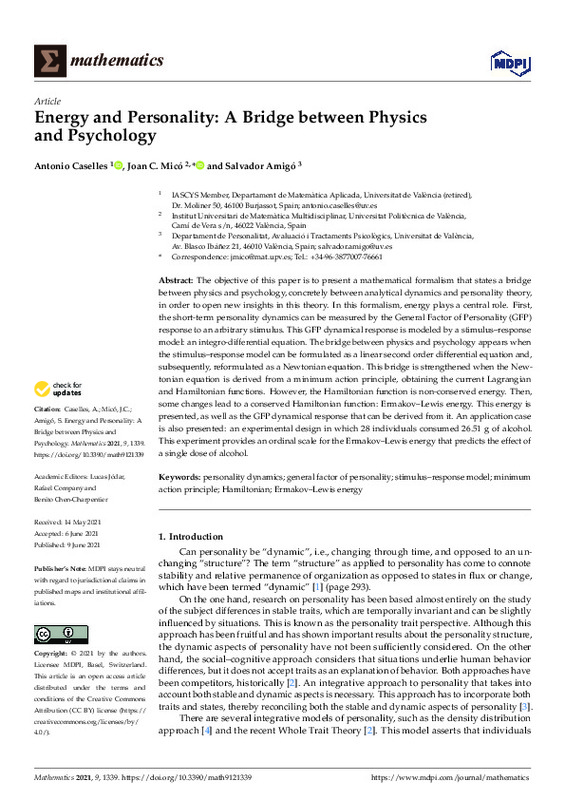JavaScript is disabled for your browser. Some features of this site may not work without it.
Buscar en RiuNet
Listar
Mi cuenta
Estadísticas
Ayuda RiuNet
Admin. UPV
Energy and Personality: A Bridge between Physics and Psychology
Mostrar el registro sencillo del ítem
Ficheros en el ítem
| dc.contributor.author | Caselles, Antonio
|
es_ES |
| dc.contributor.author | Micó, Joan C.
|
es_ES |
| dc.contributor.author | Amigó, Salvador
|
es_ES |
| dc.date.accessioned | 2022-02-28T08:14:27Z | |
| dc.date.available | 2022-02-28T08:14:27Z | |
| dc.date.issued | 2021-06 | es_ES |
| dc.identifier.uri | http://hdl.handle.net/10251/181134 | |
| dc.description.abstract | [EN] The objective of this paper is to present a mathematical formalism that states a bridge between physics and psychology, concretely between analytical dynamics and personality theory, in order to open new insights in this theory. In this formalism, energy plays a central role. First, the short-term personality dynamics can be measured by the General Factor of Personality (GFP) response to an arbitrary stimulus. This GFP dynamical response is modeled by a stimulus¿response model: an integro-differential equation. The bridge between physics and psychology appears when the stimulus¿response model can be formulated as a linear second order differential equation and, subsequently, reformulated as a Newtonian equation. This bridge is strengthened when the Newtonian equation is derived from a minimum action principle, obtaining the current Lagrangian and Hamiltonian functions. However, the Hamiltonian function is non-conserved energy. Then, some changes lead to a conserved Hamiltonian function: Ermakov¿Lewis energy. This energy is presented, as well as the GFP dynamical response that can be derived from it. An application case is also presented: an experimental design in which 28 individuals consumed 26.51 g of alcohol. This experiment provides an ordinal scale for the Ermakov¿Lewis energy that predicts the effect of a single dose of alcohol. | es_ES |
| dc.language | Inglés | es_ES |
| dc.publisher | MDPI AG | es_ES |
| dc.relation.ispartof | Mathematics | es_ES |
| dc.rights | Reconocimiento (by) | es_ES |
| dc.subject | Personality dynamics | es_ES |
| dc.subject | General factor of personality | es_ES |
| dc.subject | Stimulus-response model | es_ES |
| dc.subject | Minimum action principle | es_ES |
| dc.subject | Hamiltonian | es_ES |
| dc.subject | Ermakov-Lewis energy | es_ES |
| dc.subject.classification | MATEMATICA APLICADA | es_ES |
| dc.title | Energy and Personality: A Bridge between Physics and Psychology | es_ES |
| dc.type | Artículo | es_ES |
| dc.identifier.doi | 10.3390/math9121339 | es_ES |
| dc.rights.accessRights | Abierto | es_ES |
| dc.contributor.affiliation | Universitat Politècnica de València. Departamento de Matemática Aplicada - Departament de Matemàtica Aplicada | es_ES |
| dc.description.bibliographicCitation | Caselles, A.; Micó, JC.; Amigó, S. (2021). Energy and Personality: A Bridge between Physics and Psychology. Mathematics. 9(12):1-20. https://doi.org/10.3390/math9121339 | es_ES |
| dc.description.accrualMethod | S | es_ES |
| dc.relation.publisherversion | https://doi.org/10.3390/math9121339 | es_ES |
| dc.description.upvformatpinicio | 1 | es_ES |
| dc.description.upvformatpfin | 20 | es_ES |
| dc.type.version | info:eu-repo/semantics/publishedVersion | es_ES |
| dc.description.volume | 9 | es_ES |
| dc.description.issue | 12 | es_ES |
| dc.identifier.eissn | 2227-7390 | es_ES |
| dc.relation.pasarela | S\439203 | es_ES |
| upv.costeAPC | 432,82 | es_ES |








